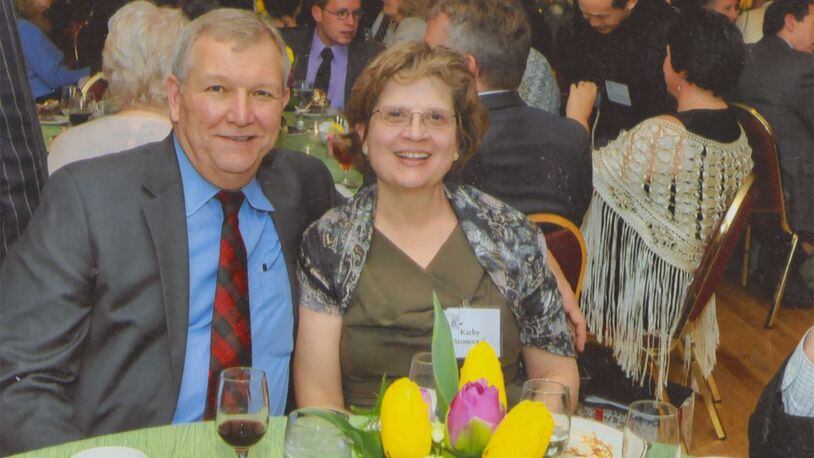“When I graduated from the University of Dayton in 1977, I wasn’t sure what I wanted to do,” Stonecast says.
Now a resident of Springboro, Stonecash majored in history and psychology. After college, he ended up working for the local Jerry Lewis Muscular Dystrophy Telethon. He did that for nine years, developing skills in special event organization and fundraising.
“I was interviewing for positions in 1987 and a friend suggested I apply for something at UD,” Stonecash says. “I applied for the assistant dean for external relations at the School of Law and got the job.”
During his time at UD, Stonecash and his team began raising money to build Joseph E Keller Hall. In 1995, Stonecast became a recipient of the President’s Award for his contributions to the School of Law. He developed and organized special events and supported alumni with programming and a directory. He retired from UD in 2016.
He took on part-time work, but still had a big interest in writing.
He got serious about writing five years ago with his plans for a memoir, Stonecash says. As the story evolved, he decided it worked better as a part autobiographical, part fictional novel. The book, “Searching” (Between the Lines Publishing, 266 pages, $14.99), is set in Miamisburg in the 1960s and touches on many themes, including race, freedom, belonging and family.
“This was a time of a lot of social upheaval,” Stonecash says. “And there were many things that touched the life of the main character including the Vietnam War, the Kennedy assassination, the civil rights movement, the moon landing and the Cuban Missile Crisis.”
Stonecash describes his own growing up years as completely “homogeneous,” with little to no diversity.
“It’s hard to relate to other folks that aren’t like you unless you are around them,” Stonecash says. “This book explores all of that.”
When President John F. Kennedy was shot, Stonecash was10 years old. It ended up being a hard lesson for him and the book’s main character, also named Tim, that people don’t live forever.
“Everybody who was alive on November 22, 1963, can remember where they were when JFK was killed,” Stonecash says. “That’s how I start the book.”
From there, Stonecash writes about race riots in Dayton and his main character running away to California to join a “bunch of misfits” during the so called “Summer of Love.” After this period, Tim in the book returns home and joins the Army.
“I did go to California, and I was in the Army for three years,” Stonecash says. “I was lucky enough that the Vietnam War was winding down and I never saw combat.”
Stonecash also incorporates his family into his novel. An only child, he was raised mostly by his mother after his father died when he was 13.
After friends and family suggested that Stonecash write about what he knew best, he decided the decades in which he grew up and that greatly affected his life would be the perfect setting.
“I knew that people who had lived through those decades would have an interest, but so much happened, that I figured a lot of people would want to read a book about that time,” Stonecash says.
Once he started the book as a memoir, he decided it was too boring and decided to embellish with fictional elements. He took some writing classes and was encouraged to read and reflect on how much his life had changed.
“Writing this book was a long process,” Stonecash says. “I wanted it to be published by a traditional publisher. I sent out between 50 and 60 query letters and finally got two who said they would take it.”
His editors cut 15,000 words from his original manuscript and he had to learn to be patient and accept that the professionals knew what would help move the story along.
“The two best days are the day your book is published, and the day it arrives in the mail,” Stonecash says.
With his second book – a series of short stories about a Nazi judge during World War II – nearing publication, Stonecash is already finishing up the third, another that is closely connected to his own life story.
“The third book is about a high school basketball coach,” Stonecash, who coached the sport himself at the high school level, says. “He wishes he could go back in time and change a few things and it turns out that things were better right where he was.”
About the Author
